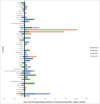Reflections on 50 years of immunisation programmes in the WHO African region: an impetus to build on the progress and address the unfinished immunisation business
- PMID: 40398892
- PMCID: PMC12097073
- DOI: 10.1136/bmjgh-2024-017982
Reflections on 50 years of immunisation programmes in the WHO African region: an impetus to build on the progress and address the unfinished immunisation business
Abstract
Immunisation is crucial to achieving the Sustainable Development Goals for maternal and child mortality reduction. As Africa marks the 50th anniversary of implementing immunisation programmes, it is imperative to review progress, address challenges and strategise for the future. Using available programme data, this article examines the progress made in achieving the immunisation milestones in the region, describes the success factors and lessons learnt and makes recommendations on how to immunise every African child in the coming years. The article concludes that despite significant improvements in childhood immunisation coverage, the region still falls short of global targets, with disparities across countries. Contributing factors include, among others, weak health systems, rapid population growth without corresponding increases in service delivery, vaccine hesitancy, inadequate sustainable financing and disruptions caused by the COVID-19 pandemic. Moving forward, efforts to attain the global immunisation coverage milestones should focus on building on the past progress, addressing the COVID-19 setbacks, leveraging new technologies and securing sustainable immunisation funding. This can be achieved by accelerating the implementation of the Immunization Agenda 2030 and the Addis Ababa Declaration on Immunization commitments. The support of all stakeholders including political leaders, public health professionals, the vaccine industry, regional organisations, academia, donors and healthcare workers is essential for this noble endeavour.
Keywords: Africa South of the Sahara; Child health; Immunisation; Public Health.
© World Health Organization 2025. Licensee BMJ.
Conflict of interest statement
Competing interests: None declared.
Figures




Similar articles
-
How to Implement Digital Clinical Consultations in UK Maternity Care: the ARM@DA Realist Review.Health Soc Care Deliv Res. 2025 May;13(22):1-77. doi: 10.3310/WQFV7425. Health Soc Care Deliv Res. 2025. PMID: 40417997 Review.
-
Estimating the health effects of COVID-19-related immunisation disruptions in 112 countries during 2020-30: a modelling study.Lancet Glob Health. 2024 Apr;12(4):e563-e571. doi: 10.1016/S2214-109X(23)00603-4. Lancet Glob Health. 2024. PMID: 38485425 Free PMC article.
-
Contribution of polio eradication initiative to strengthening routine immunization: Lessons learnt in the WHO African region.Vaccine. 2016 Oct 10;34(43):5187-5192. doi: 10.1016/j.vaccine.2016.05.062. Epub 2016 Jul 7. Vaccine. 2016. PMID: 27396492
-
Health professionals' experience of teamwork education in acute hospital settings: a systematic review of qualitative literature.JBI Database System Rev Implement Rep. 2016 Apr;14(4):96-137. doi: 10.11124/JBISRIR-2016-1843. JBI Database System Rev Implement Rep. 2016. PMID: 27532314
-
Sero-prevalence of SARS-CoV-2 antibodies in Ethiopia: Results of the National Population Based Survey, 2021.PLoS One. 2025 May 6;20(5):e0313791. doi: 10.1371/journal.pone.0313791. eCollection 2025. PLoS One. 2025. PMID: 40327714 Free PMC article.
References
Publication types
MeSH terms
Grants and funding
LinkOut - more resources
Full Text Sources
Medical
Research Materials
Miscellaneous
